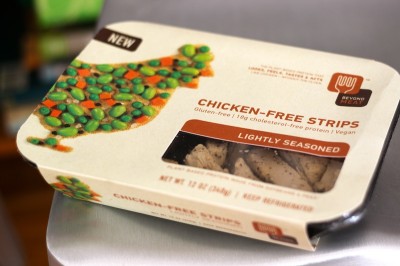 Eating meat could become a thing of the past if two of the biggest names in technology get their way.
Eating meat could become a thing of the past if two of the biggest names in technology get their way.
Microsoft founder Bill Gates and Google co-founder Sergey Brin are both promoting the idea that meat is bad for the planet and needs to be replaced.
Each of the billionaires is now actively promoting meat alternatives in an attempt to get people to stop being carnivores. Gates is promoting plant-based alternatives to meat such as soy, while Brin has gone much farther and has financed an experiment in which “beef” was grown in a test tube.
“If what you’re doing is not seen by some people as science fiction, it’s probably not transformative enough,” Brin said in a video promoting his project.
Gates has said the “future of meat is vegan.”
The Google Burger
Brin contributed $405,000 of his own money to a project to grow hamburger from cow stem cells at Maastricht University in the Netherlands. The scientist behind the project, Mark Post, succeeded in growing a burger that was successfully cooked and eaten in London last year.
“By our technology we actually are producing meat, it’s just not in a cow,” Post said. “A few cells we take from this cow can turn into 10 tons of meat.”
Post takes stem cells from a cow and uses them to grow meat using techniques similar to those used to grow skin for skin grafts and other medical procedures. Post predicted that laboratory grown meat will be available in supermarkets within 20 years.
“From an ethical point of view it only has benefits,” Post said of his research.
Brin justified his support for the project from a concern for animal welfare. Brin believes that modern meat production is wrong and unethical. He told The Guardian that he’s concerned about the welfare of cows.
Post said it would help the environment.
“Cows are inefficient, they require 100 grams of vegetable protein to produce only 15 grams of edible animal protein,” Post told The Guardian, “… We don’t need to kill the cow and it doesn’t produce any methane.”
Their sentiment echoes that of the radical animal rights group People for the Ethical Treatment of Animals (PETA), has long promoted the idea that meat production is immoral because it causes suffering to animals.
Not surprisingly, PETA praised Brin’s burger in a post at its blog. The organization stated that the burgers would eliminate the slaughter of billions of animals and help the environment.
Some critics also say that Brin’s burger is the next logical step in industrialized food. Instead of helping animals, Brin could be helping Big Food make billions in the future.
Bill Gates’ Crusade against Meat
Gates’ opposition to meat is taking a different course but employs many of the same language. Instead of financing cow stem cell research, Gates is promoting companies that turn plant-based products into meat substitutes. The billionaire has posted a slide show promoting his ideas and an interview with author Michael Pollan at his website.
Gates doesn’t say what he thinks of factory farming but he does post this quote from Pollan at his website: “The animal factories that produce most of our meat and milk are brutal places where animals suffer needlessly.”
Most of Gates’ argument is based around the environmental and health effects of meat. He claims there simply is not a way to produce enough meat for everybody in the world. Yet he also notes that meat consumption has doubled in the last 20 years.
Gates recommends two companies — Beyond Meat and Hampton Creek Foods — which are marketing vegetable-based alternatives to meat. He claims that Beyond Meat’s chicken substitute tastes just like real chicken.
Unlike Brin, Gates’ agenda seems to be geared more toward changing the diet for environmental and health reasons. Instead of radical shifts, Gates seems to be more interested in changing thinking.
“If we shift our thinking about what we eat, and how it gets to our plates, we’ll be more open to the food innovations that are out there,” Gates wrote.
So should we be worried about these innovations and the men behind them? That’s a good question, although given the history of processed food and its effects on health we should be asking serious questions.
Sign up for Off The Grid News’ weekly email and stay informed about the issues important to you
 Off The Grid News Better Ideas For Off The Grid Living
Off The Grid News Better Ideas For Off The Grid Living




